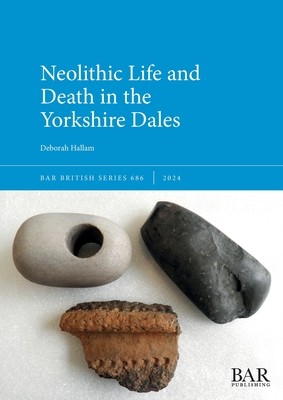
- We will send in 10–14 business days.
- Author: Deborah Hallam
- Publisher: British Archaeological Reports (Oxford) Ltd
- ISBN-10: 1407361872
- ISBN-13: 9781407361871
- Format: 21 x 29.7 x 1.1 cm, minkšti viršeliai
- Language: English
- SAVE -10% with code: EXTRA
Reviews
Description
This book represents the first synthesis of the Neolithic archaeology of a pastoral, upland region of northern England that has historically been poorly represented in the archaeological record. Importantly for scholars of the period, the study identifies the changes that mark the Mesolithic-Neolithic Transition in the Yorkshire Dales, finding it to be in progress at the same time as adjoining northern counties, thus proving the region to be no cultural backwater, despite the topography.
Questions around how the region became peopled by farmer-settlers with new lifeways are discussed, with cultural influences identified. Burial practices are compared beyond the area and are found to align with country-wide practices, whereas built monuments reflect increasing social complexity and population growth.
A must-read for any scholar or enthusiast of British prehistory, this study brings to light a fascinating insight into the earliest farming communities and cultural practices commencing during a period of irrevocable social change.
EXTRA 10 % discount with code: EXTRA
The promotion ends in 23d.19:56:17
The discount code is valid when purchasing from 10 €. Discounts do not stack.
- Author: Deborah Hallam
- Publisher: British Archaeological Reports (Oxford) Ltd
- ISBN-10: 1407361872
- ISBN-13: 9781407361871
- Format: 21 x 29.7 x 1.1 cm, minkšti viršeliai
- Language: English English
This book represents the first synthesis of the Neolithic archaeology of a pastoral, upland region of northern England that has historically been poorly represented in the archaeological record. Importantly for scholars of the period, the study identifies the changes that mark the Mesolithic-Neolithic Transition in the Yorkshire Dales, finding it to be in progress at the same time as adjoining northern counties, thus proving the region to be no cultural backwater, despite the topography.
Questions around how the region became peopled by farmer-settlers with new lifeways are discussed, with cultural influences identified. Burial practices are compared beyond the area and are found to align with country-wide practices, whereas built monuments reflect increasing social complexity and population growth.
A must-read for any scholar or enthusiast of British prehistory, this study brings to light a fascinating insight into the earliest farming communities and cultural practices commencing during a period of irrevocable social change.


Reviews